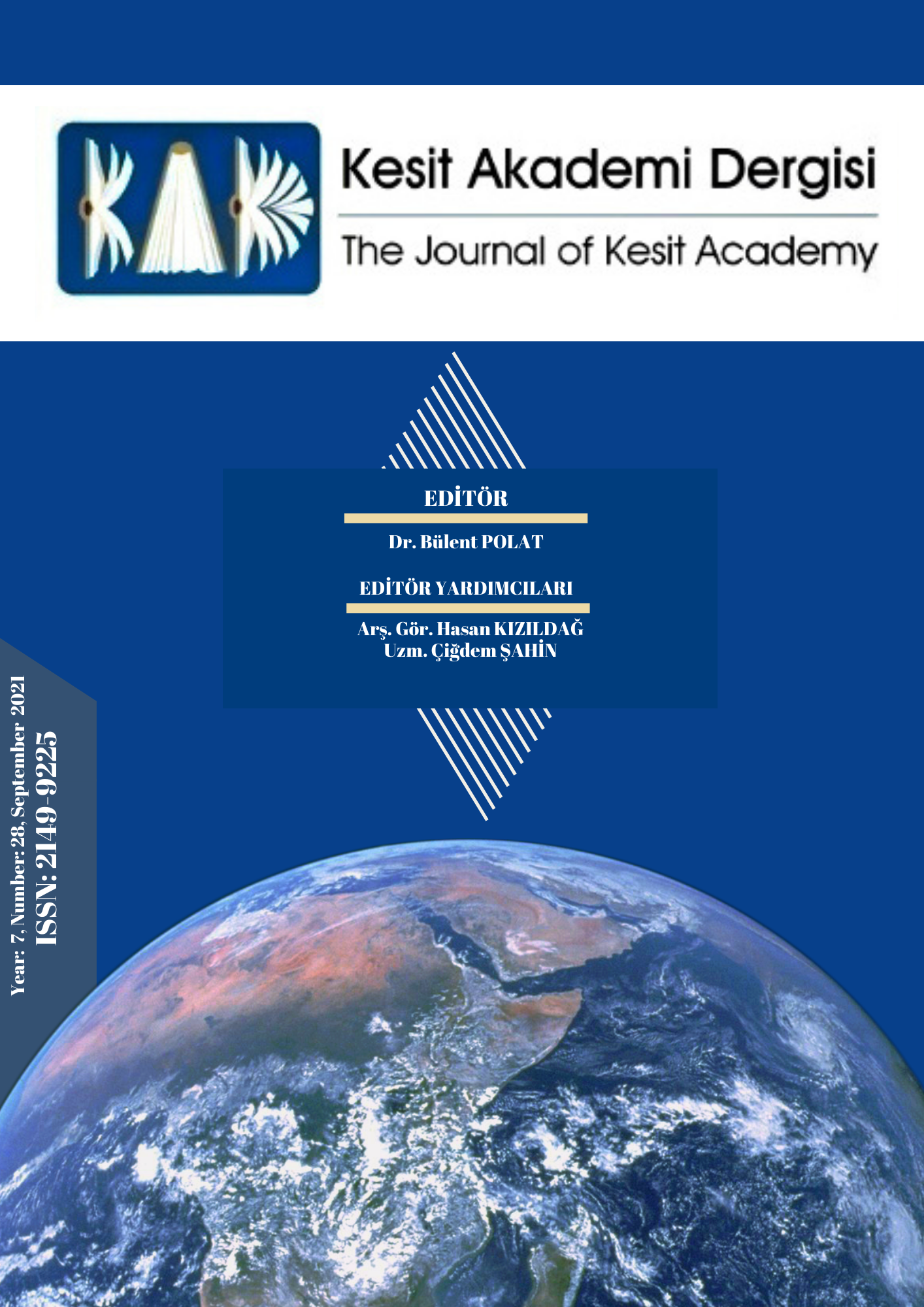Author :
Abstract
Osmanlı’nın Batı’yı model alan politikaları Gülhane Hattı Hümayunu ile başlamış, Batılılaşma sürecine girilmiştir. Bu süreçle birlikte politikadan sanata, görgü kurallarından, aile içi ilişkilere tüm alanlarda radikal değişimler yaşanmaya başlamıştır. Gündelik hayatta Batının gördüğü sorunsuz kabul, tiyatro alanında da yansımasını bulmuştur. Sahnede yansımasını bulan konu ve temalardan en önemlilerinden biri Aile’dir. Geleneksel tiyatroda kutsal inanışların etkisiyle dışlanan aile, evrensel bir kurum olması ve ortaya dramatik durumlar çıkarmaktaki elverişliliği nedeniyle Batılılaşma ideolojisiyle gelişen Türk tiyatrosunun da merkezine yerleşmiştir. Batılılaşmayla birlikte gelen değişim, aile kurumunu farklı biçimlerde etkilemiş, bu etkinin en ilginç olanlarından birisi de Alafrangalık tutkusu olmuştur.
Keywords
Abstract
The Ottoman Empire, which took the West as a model, started with The Royal Declaration of Gülhane and the process of Westernization was entered. Along with this process, radical changes began to occur in all areas from politics to art, from etiquette to family relations. The uneventful acceptance of the West in daily life has also found its reflection in the field of theatre. One of the most important subjects and themes that find their reflection on the stage is Family. The family, which is excluded under the influence of sacred beliefs in traditional theater, has also settled in the center of Turkish Theater, which developed with the ideology of Westernization, due to its universality and its convenience in creating dramatic situations. The change that came with Westernization has affected the family institution in different ways, one of the most interesting of this effect is the passion of “Alafrangalık”.
Keywords
- And, M. (1972). Tanzimat ve istibdat döneminde Türk tiyatrosu 1839-1908. Türkiye İş Ban- kası.
- Aydın, M. (1997). Kurumlar sosyolojisi, Vadi.
- Akı, N. (1974). XIX. yüzyıl Türk tiyatrosunda devrin hayat ve insanı. Atatürk Üniversitesi.
- Banarlı, N. S. (1992). “Önsöz”, yaprak dökümü, Meb.
- Barbarosoglu, F.K. (2004). Moda ve zihniyet, İz.
- Cem, İ. (1973). Türkiye’de geri kalmışlığın tarihi. Cem.
- Enginün, İ. (1990). Ahmet Mithat Efendi’nin tiyatrolarına dair, Ahmet Mithat Efendi’nin tiyatroları, Marmara Üniversitesi.
- Göle, N. (2004). Modern mahrem, Metis.
- Ziya Gökalp (1963). Türkçülüğün esasları. Varlık.
- Ozankaya, Ö. (1999). Toplumbilim, Cem.
- Ortaylı, İ. (2005). İmparatorluğun en uzun yüzyılı. İletişim.
- Özer, İ. (2005). Batılaşma ya da batılılaşma, Truva.
- Parla, J. (2002). Babalar ve oğullar. İletişim.
- Poster, M. (1989). Eleştirel aile kuramı (Çev: Hüseyin Tapınç). Ayrıntı.
- Sayın, Ö (1990). Aile sosyolojisi, Ege Üniversitesi.
- Şener, S. (1963). Müsahipzade Celal ve tiyatrosu, Ankara Üniversitesi Dil Tarih Coğrafya Fakültesi.
- Şener, S. (1972). Çağdaş Türk tiyatrosunda insan, Ankara Üniversitesi Dil Tarih Coğrafya
- Timur, T. (1991). Osmanlı-Türk toplumunda tarih, toplum ve kimlik, Afa.
- Töre, E. (2006). Meşrutiyet tiyatrosu. Duyap.
- Yasa, İ. (1982). Türk toplum bilimcileri (Aktaran: E. Kongar). Remzi.
- Durakbaşa, A. (1998). Cumhuriyet döneminde modern kadın ve erkek kimliklerinin oluşumu: Kemalist kadın kimliği ve “münevver erkekler”. İçinde Ayşe Berktay Mirzaoğlu (Ed.), 75 Yılda Kadınlar ve Erkekler, (29-50). Tarih Vakfı.
- Fındıkoglu, Z. F. (1999). Tanzimatta içtimai hayat, Tanzimat 2, Meb Yayınları, 619-659.
- Kandiyoti, D. (1984). Aile yapısında değişme ve süreklilik: karşılaştırmalı bir yaklaşım. İçinde Türköz Erder (Ed.), Türkiye’de ailenin değişimi-toplumbilimsel incelemeler (15-33). Türk Sosyal Bilimler Derneği. Cevdet Kudret. (1984). Alafranga dedikleri. Tarih Toplum Dergisi, 1, 267-271
- Kandiyoti, D. (2014). Modernin cinsiyeti: Türk modernleşmesi araştırmalarında eksik boyutlar, İçinde Bozdogan ve Kasaba (Ed.), Türkiye’de modernleşme ve ulusal kimlik, (115-134). Tarih Vakfı Yurt.
- Kıray, M. (1984). Büyük kent ve değişen aile. İçinde Türköz Erder (Ed.), Türkiye’de aile- nin değişimi-toplumbilimsel incelemeler (69-78). Türk Sosyal Bilimler Derneği.
- Merter, F. (1990). Türkiye’de toplumsal ve ekonomik gelişmenin 50.yılı, 1950-1988 yılla- rı arasında köy ailesinde meydana gelen değişmeler (27-28). T.C Başbakanlık Araştırma Kurumu Başkanlığı.
- Ortaylı, İ. (1984). Osmanlı toplumunda aile. İçinde Türköz Erder (Ed.), Türkiye’de aile- nin değişimi-toplumbilimsel incelemeler (79-89). Türk Sosyal Bilimler Derneği.
- Özbay, F. (1984). Kırsal kesimde toplumsal ve ekonomik yapı değişmelerinin aile iş- levlerine yansıması. İçinde Türköz Erder (Ed.), Türkiye’de Ailenin Değişimi - Toplumbilimsel İncelemeler (35-68). Türk Sosyal Bilimler Derneği.
- Tokgöz, O. (1984). Kentlerde kitle haberleşme araçları ve aile tüketim biçimleri. İçinde Türköz Erder (Ed.), Türkiye’de ailenin değişimi - toplumbilimsel incelemeler (215253). Türk Sosyal Bilimler Derneği.
- Türkdogan, O. (1993). Türk ailesinin genel yapısı, sosyo-kültürel değişme sürecinde Türk aile yapısı, (22-59). T.C Başbakanlık Aile Araştırma Kurumu.
- Şener, S. (1989). Oyun yazarı Reşat Nuri Güntekin. Hürriyet Gösteri, 109, 24-25.
- Altan, Ç. (1965). Mor defter. Meb Yayınları.
- Güntekin, R. N (1992). Yaprak dökümü. Meb Yayınları.
- İbnü’r Refik Ahmet Nuri. Gerdaniye buselik, Aktaran: Töre, E. (2006). Meşrutiyet Tiyatro- su, Duyap Yayınları.
- Karı Koca Muarazası. Aktaran: And, M. (1972). Tanzimat ve İstibdat döneminde Türk Ti- yatrosu 1839-1908, Türkiye İş Bankası Yayınları.
- Mustafa Fahri. İşte Alafranga, Aktaran: And, M. (1972). Tanzimat ve İstibdat Döneminde Türk Tiyatrosu 1839-1908, Türkiye İş Bankası Yayınları.
- Şahabettin Süleyman. Fırtına, Aktaran: And, M. (1972). Tanzimat ve İstibdat döneminde
- Sabuncu, B. (1970). Çark, Çoğaltma Metin, Özdemir Nutku Belgeliği.





